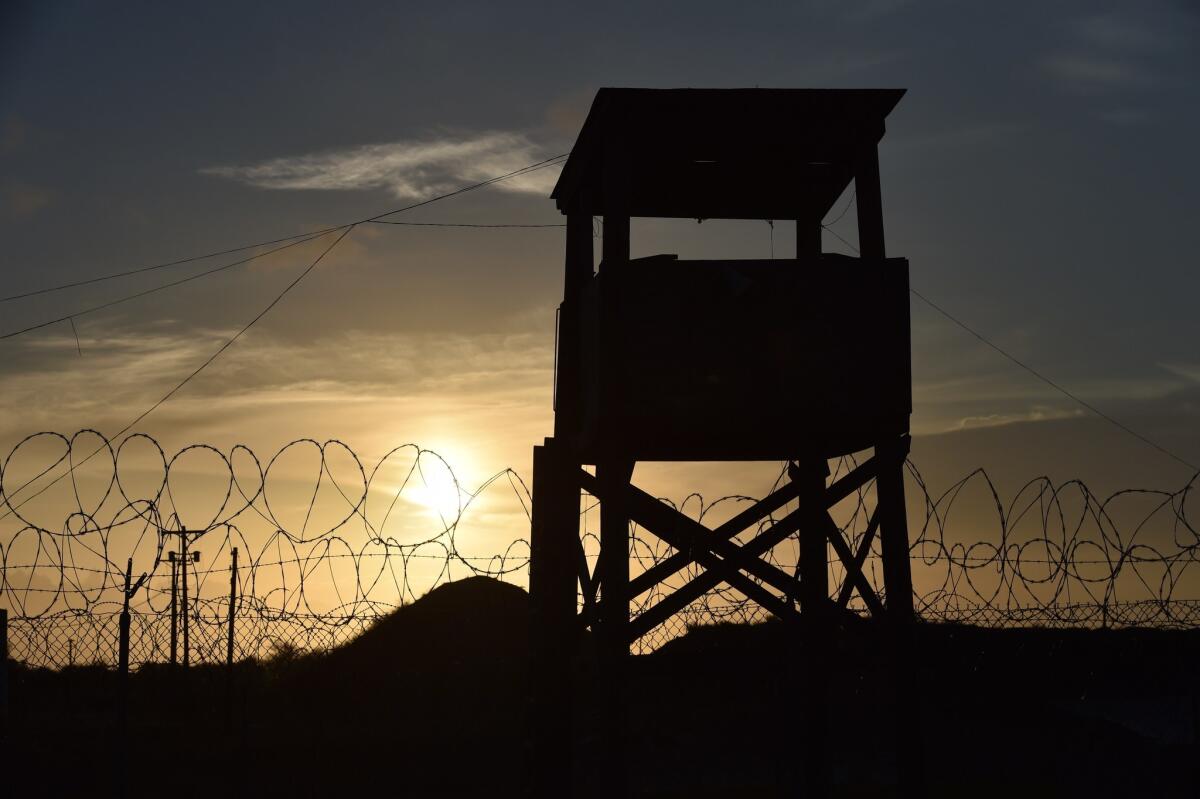U.S. officials send Kuwaiti man home from Guantanamo Bay prison

- Share via
Reporting from Washington — A long-held Al Qaeda suspect at Guantanamo Bay was sent home to Kuwait early Wednesday after U.S. officials concluded he does not pose a threat to the United States.
Fawzi Odah, 37, was never charged or put on trial during his 13 years in the U.S. military prison set up in Cuba for terrorism suspects after the Sept. 11, 2001, terrorist attacks.
His departure leaves 148 detainees in a facility that President Obama has repeatedly vowed to close. Of those, 79 have been recommended for transfer.
Odah is the first detainee transferred from Guantanamo Bay since May, when the administration released five high-level Afghan Taliban detainees in exchange for Sgt. Bowe Bergdahl, a U.S. soldier who was held by the Taliban for five years.
This year, Odah’s American lawyers filed a lawsuit challenging his detention as a violation of international law because prisoners of war should be released once a war ends. U.S. combat troops are withdrawing from Afghanistan, although the conflict there continues.
But it took the Obama administration’s new periodic review board system to rule that Odah, who was captured in the early days of the U.S. war in Afghanistan, was not a potential threat.
The parole-like boards were set up to determine whether more prisoners could be sent home from the controversial prison, and he is the first person to be repatriated under that system.
In a statement, the Pentagon said board members had determined further detention of Odah “does not remain necessary to protect against a continuing threat to the security of the United States.”
In a separate report, the board cited Odah’s “low level of training and lack of a leadership position in Al Qaeda” as well as his family support and Kuwaiti security measures.
Officials said Kuwait’s government has agreed that Odah will remain in custody as part of a yearlong rehabilitation program.
Odah was captured shortly after the U.S.-led invasion of Afghanistan in late 2001. His family said he was serving as a refugee relief worker when he was taken by bounty hunters and turned over to U.S. forces.
U.S. intelligence officials believed Odah was an associate of Al Qaeda founder Osama bin Laden, based largely on information from other captives.
Kuwaiti leaders sought to gain Odah’s release, appealing to Presidents George W. Bush and Obama. A top Kuwaiti official attended his review board hearing in July, stressing his government’s desire for Odah’s repatriation.
The prisoner’s father, Khalid Odah, a U.S.-trained Kuwaiti air force officer who had worked with U.S. troops in the 1991 Persian Gulf War, also campaigned to win his release.
In an interview with The Times in 2003, he expressed his family’s frustration. “I thought the Americans would check with my son and find him innocent and release him immediately,” the father said at the time. “I know how honest the Americans are.”
“Fawzi is delighted to be going home to reunite with his family and we will be delighted to see him,” his father said in a statement Wednesday.
He thanked the government of Kuwait and “so many others who have been working for his release.”
Zeke Johnson, a director at Amnesty International, welcomed the transfer but added that the remaining detainees at Guantanamo Bay “should either be fairly tried in federal court or released.”
On Twitter: @RickSerranoLAT
More to Read
Sign up for Essential California
The most important California stories and recommendations in your inbox every morning.
You may occasionally receive promotional content from the Los Angeles Times.













